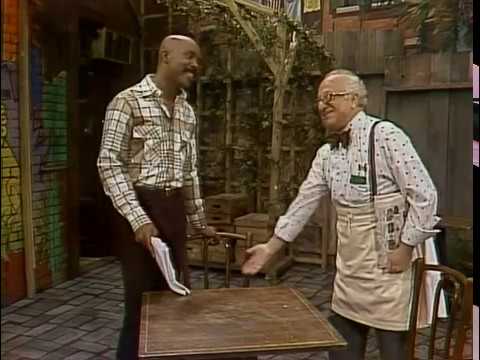It’ll never be the same around here without him. But you know something? We can all be very happy that we had the chance to be with him, and to know him, and to love him a lot when he was here.
Will Lee died the day after I turned six. My father would die two months and a day later. Because of that, Will Lee and Mr. Hooper are a prominent point of my childhood and are weighted with emotion for me. Now, I am not alone in this; for a lot of people around my age, Mr. Hooper was the first death they experienced. This wasn’t true for me, and not just because the episode about Mr. Hooper’s death aired on Thanksgiving Day, 1983—well after I was grieving for my father. My older sister’s godfather had also died, before Dad did. But Mr. Hooper is still part of those emotions and an intimate aspect of how my generation learned about grief.
There was more to Will Lee’s career than Mr. Hooper—a lot more, actually. His career goes so far back that he was in the Federal Theatre Project. He served in World War II putting on performances for the troops; he was cited twice for his work. He made his film debut in the 1941 Red Skelton vehicle Whistling in the Dark, though his film and Broadway careers did have that pause for the war. Still, given his last film before joining the military was Hitchcock’s Saboteur, it’s clear that, while he was never a star in those days, he still appeared in more than a few stone-cold classics.
After the war, he would come back to both the screen and the stage. There were a few more screen classics, and also Little Fugitive, which feels to me kind of like an expanded “Johnny Goes to the Fair,” but at very least it features Lee as a kindly photographer who takes the title character’s picture. He was Will “Pa” Hughes for the first season of As the World Turns. The role would then be recast, though I don’t know why. However, it was something of a lean time for Lee—the period between then and Sesame Street would be difficult for him.
You see, Lee had been a member of the Group Theatre, which the HUAC felt was a hotbed of Communism. People in that circle either testified or didn’t. Lee was an unfriendly witness and was blacklisted on film and television for five years. Indeed, many of Lee’s classic movies were considered to have a leftist bent as well. Was Will Lee a Communist? It seems not. However, he wouldn’t testify, for whatever reason—there are so many good reasons not to have testified—and the impact on his career is apparent.
In fact, he seems to have really wanted the role of Mr. Hooper because of the show’s planned educational benefit for inner city children. Lee himself had been poor as a child, and it seems likely he saw the value to it. I’ve read that Lee cried when he got the role and was thrilled and how warm and friendly Jim Henson and others were. He befriended the other cast members, and their reactions in that scene are real. Carroll Spinney had told him, just a few days before Lee’s death, that he loved him, and he wasn’t the only one on the set who did. Sesame Street taught us that people die, just because, and there’s nothing anyone can do about it. Even for those of us who’d already learned about death, Mr. Hooper was part of our education.
Today’s article is brought to us by the kind websites Patreon and Ko-fi!


